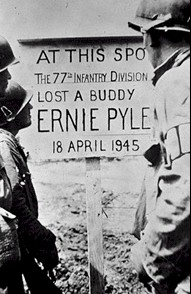I feel a little silly
about this.
The National Association of
Newspaper Columnists suggests all its members write a
special piece on April 18th to commemorate National  Columnists Day. Even for people possessed of
sufficient hubris to choose a profession based on the
foundation that their opinion is worth reading, the
idea of a designated day seems a bit much.
Columnists Day. Even for people possessed of
sufficient hubris to choose a profession based on the
foundation that their opinion is worth reading, the
idea of a designated day seems a bit much.
Frankly, I’d have an easier
time writing about September 14th, which has been
designated National Cream-filled Donut Day. If people
had to choose between donuts or columnists, well, let’s
just say there would be a bull market for big man’s
and plus-sized clothing.
On the other hand, for columnists,
April 18th is for singing dirges in the dark. It is
the Day the Music Died. In 1945, World War II
correspondent Ernie Pyle, considered the greatest
columnist ever, was shot and killed by a Japanese
sniper on a tiny island near Okinawa.
Any journalist driving his Chevy
to the levee of inspiration and finding it dry should
forget about whiskey and rye and turn instead
to a copy of Pyle’s "Here Is Your War."
Nobody could bring home the essence of an event
better than this guy. An awful lot of modern-day
columnists are kind of like a gabby, hat-wearing
woman sitting in front of you at the movies: Not only
is her big head blocking your view, but she keeps
yakking about what it is you are going to see. And
she’s usually wrong.
event
better than this guy. An awful lot of modern-day
columnists are kind of like a gabby, hat-wearing
woman sitting in front of you at the movies: Not only
is her big head blocking your view, but she keeps
yakking about what it is you are going to see. And
she’s usually wrong.
So I think it’s fine to have
a day for Ernie Pyle, especially since most Americans
could probably tell you more about Gomer Pyle. But I’m
still not so sure columnists should get their own
celebration. There are far too many of them who
refuse to let not having anything to say get in their
way. The thing about Ernie Pyle’s writing that
was so terrific and unfortunately, so unique, was
that he knew that World War II was about the G.I.s
and not the generals. The big picture is really a lot
of little ones.
My beef with the national,
syndicated columnists is that they all write about
the same thing. This week it’s "all Elian
all the time." Maybe there is some drama in the
little waif‘s story, but in the four months we’ve
been reading about Elian the Alien, stuff happened to
other six-year-olds, too.
In the last 120 days, 77 American
six-year-olds died in car accidents. 82 in other
types of mishaps. 86 succumbed to some sort of
illness. 15 were traced in the chalk outline of a
homicide. 177 more were lost to a variety of other
causes.
Somewhere in those numbers you
would think would be a tale more worth telling than
whether or not Elian Gonzalez spends his next
birthday at Disneyworld or wearing an "I Love
Fidel" T-shirt. The big-name inkslingers seem to
think all we want to hear about is Elian, George W.,
Monica, Microsoft or whatever the flavor of the week
happens to be.
And because they follow each other
like lemmings, perspective often gets obscured. After
the Columbine shootings, it was de rigeur for
everyone to write about it. If you only read opinion,
you would never know that school shootings are down,
not up, in the past five years.
Local columnists remind of the Mae
West remark: "When I'm good I'm very good, but
when I'm bad, I'm better," except when they are
bad, they are downright awful. A good local writer
makes a newspaper worth buying. Sports Illustrated
could send twenty writers to cover the UConn women’s
basketball championship, but all of them put together
couldn’t describe what the team means to the
state as well as Randy Smith.
Some local scribblers are too busy
grinding their Paul Bunyan-sized axes to investigate
or re-evaluate their positions. There are newspaper
writers who just like to bash the cops, welfare
reform, drug policy or Governor Rowland no matter
what. Real life is usually more complicated than that.
Most of the time, I think people
like to read what they want to hear and that’s
how they choose their favorite columnists. But every
once in a while, I get a letter or an e-mail from
someone who says something I wrote made them stop and
think.
And that’s why columnists
write columns. But while we’re coming up
with ways to make other people pause for thought, it
wouldn’t hurt to do a little more of it
ourselves.